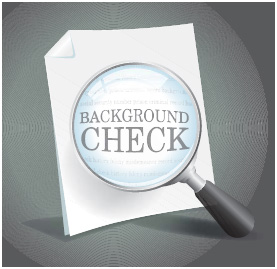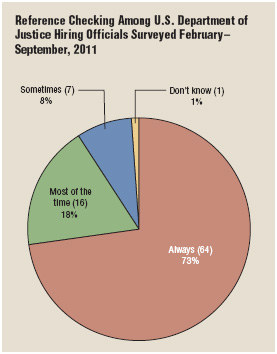What Is a Preemployment Background Screen?
A preemployment background screen refers to the investigation of a job applicant's background by a prospective employer. Some employers, especially government agencies, conduct extensive screens before hiring, whereas others conduct minimal or no background checks. Companies use background screens to ensure that the information that applicants have provided in a job application and résumé is accurate and that applicants possess the credentials and experience needed for the job. Background screens are also used to get information about an applicant's character and habits, which may have a bearing on later on-the-job conduct. Companies may check backgrounds as a preventative measure against any future negligent-hiring lawsuits.
Common areas of investigation include employment history, educational background, credit history, and criminal background. Employers may also require medical information or a physical exam. However, this information can legally only be considered in terms of an applicant's physical ability to perform job duties. An applicant may also be required to take a drug test. Possible involvement in workers’ compensation claims, which are a matter of public record, may also be checked. In recent years, employers have also begun to research their applicants’ presence on the Internet, including social networking sites and personal web pages.
Preemployment checks are subject to the rules laid out by the Fair Credit Reporting Act (FCRA) in 1970. According to the FCRA, a background check is defined as a consumer report. In order to obtain such a report, an employer must have the job applicant's consent in writing.
How Did Preemployment Screening Come About?
Employers have always conducted informal, piecemeal background checks on potential employees. Such checks have included contacting a job candidate's personal and professional references, including the candidate's former employers. The ability of hiring managers and other personnel to gather information about their job candidates has increased with the Internet. Many records are now available in digital form and can be accessed easily.

The use of professional preemployment screens, particularly to detect a criminal background, has increased since the late 1970s, when lawsuits alleging negligent hiring and retention practices began to multiply in response to workplace violence. The lawsuits attempted to make employers accountable for not properly investigating an employee who subsequently committed a violent act on the job. The theory of negligent hiring, which was developed through these lawsuits, has made it more likely that an employer who did not conduct an adequate background check could lose such a lawsuit and be forced to pay out large awards to the victims of workplace violence.
What Happens When an Employer Checks My Employment History?
Most employers require that you submit details about your work history and qualifications when applying for a job. It is important that the details provided be accurate, because it is likely that they will be checked. Some companies will give you an opportunity to explain a discrepancy if one is uncovered, but other companies will not alert you to the discrepancy and may decide not to offer you the job.

It is important to know that some hiring can be contingent on the information found during preemployment background screenings. ENTERLINEDESIGN/SHUTTERSTOCK.COM.
Companies may rely on internal human resources or payroll personnel to contact your former supervisors and professional references. They will verify employment dates, job descriptions, and salary details. They will likely also ask about your job performance and character. Some employers contract with third-party services to conduct this and other aspects of the background screen.
What Happens When an Employer Checks My Credit?
Some prospective employers conduct a credit check on potential new employees, especially for positions that involve money handling or money management. The FCRA requires businesses to get an applicant's written consent before running a credit check. This legislation also requires an employer to notify an applicant if negative information on the report prevented that person from being hired. In this situation, employers must furnish a copy of the report, along with information about the person's right to challenge the accuracy of information on it. You should check your own credit history before job searching so that you can correct any inaccuracies that may appear on your reports.
Companies may assign different weight to different kinds of negative items on a credit report when making hiring decisions. Employers might not consider a single late credit-card payment or debt resulting from medical bills as a sign of irresponsibility, but they would be more likely to consider unpaid balances in collection or judgments against a person as a cause of concern. Student loan defaults and home foreclosures might also preclude an employer from hiring someone.
Bankruptcy filings are a matter of public record. Employers may check to see if you have any such filings under your Social Security numbers. Although a bankruptcy may be considered as a factor in hiring decisions, federal law prohibits bankruptcy alone from being a determining factor in employment decisions made by government employers. The rules governing private employers in this regard are somewhat less clear.
What Happens When an Employer Checks My Criminal History?

Having references is important as hiring officials really do check them as demonstrated by this chart. ILLUSTRATION BY LUMINA DATAMATICS LTD. © 2015 CENGAGE LEARNING®. U.S. Department of Justice, Office of the Inspector General Evaluation and Inspections Division. “Telephone Survey Results,” Reference Checking in the Department of Justice, January 2013, 31. http://www.justice.gov/oig/reports/2013/e1302.pdf.
There is an important distinction between an arrest record and a conviction record. An arrest record is not proof that an applicant committed a crime. Therefore, an arrest record alone is not sufficient reason from a legal standpoint to disqualify a person from getting hired. A conviction record, on the other hand, does imply guilt and may be used to make a hiring decision.
On a related note, the Employee Polygraph Protection Act of 1998 protects applicants for a job in most private companies from being required to undergo polygraph tests. Exemptions include private businesses that provide alarm, guard, or armored-car services and some companies that deal with pharmaceuticals. Law enforcement agencies and other government institutions routinely administer polygraph tests as part of preemployment screening.
Can an Employer Access My Medical Records?
The Americans with Disabilities Act prevents employers from discriminatory hiring practices based on physical or mental disabilities. Although employers cannot contact your doctor for a full medical history, they are generally permitted to request verification that you meet the physical requirements of the job you are seeking. Medical confidentiality laws vary from state to state.
Some employers may mandate a physical examination be conducted on-site as a condition of employment. Employers that require you to undergo a physical exam must make the exam a requirement for all prospective employees. In addition, the focus must be on factors directly related to your ability to perform the duties the job demands, not on your general health.
What Happens When a Company Gives Me a Drug Test?
Screening for the use of illegal drugs has become an increasingly common part of preemployment testing for many companies. Drug use is known to impair job performance and increase absenteeism. Furthermore, companies may be held liable for the actions of an employee who works while intoxicated.
As part of the screening process, a company may use one of several tests that detect drug and alcohol use. Most companies screen for five major classes of illegal drugs: marijuana, amphetamines, cocaine, opiates, and phencyclidine (PCP). Urinalysis is the most common type of drug testing, but employers may also test blood, hair, sweat, or saliva. Some employers use instant-read tests, but most send the samples to an outside laboratory for examination. If you test positive for illegal drugs, it is unlikely that you will get the job.
What Other Types of Things Can an Employer Check?

Employers typically check the educational background claimed on your job application or résumé. They may contact the institution from which you graduated to verify the graduation date and the type of degree you earned. It is important for you to verify that your degree was formally awarded. Unpaid fines of various kinds can sometimes prevent a degree from being issued, even if you completed all of your coursework. Certifications and licenses are often public records and can easily be checked by employers. Accuracy in reporting this information on application materials is therefore very important.
Most employers cannot access detailed information about your military service. Military personnel can verify rank, duties, salary, and any awards and commendations received. Employers are legally prevented from discriminating against veterans or reservists who might be called back to active duty.
If you apply for a position that requires driving on the job you can expect an employer to check your driving record. Employers, however, may look into driving records at their discretion, even if driving is not a part of the advertised job. A conviction of driving under the influence (DUI) or other serious driving offense could be revealed in such a search and could be detrimental to an applicant's prospects.
How Can I Prepare for a Preemployment Background Screen?

If you know that a prospective employer will be conducting a background screen you should consider conducting your own preliminary screen, including pulling a copy of your credit report, to determine what information might be revealed. If errors or inaccuracies appear in the preliminary screen, you should follow the reporting agency's rules for addressing them. You should also check any websites you run or participate in to verify that they do not contain potentially damaging or inappropriate material. If you find such material, you should remove it if at all possible.
If you know ahead of time that an employer will discover negative information in your background you may choose to take a proactive approach. Disclosing information about poor credit or about a criminal history during the interview process may work in your favor. Hiring managers may appreciate your honesty, and opening a discussion on the topic will allow you to put the information in context. However, since employers may disregard information that has little bearing on the job at hand, you should carefully weigh this decision before proceeding.